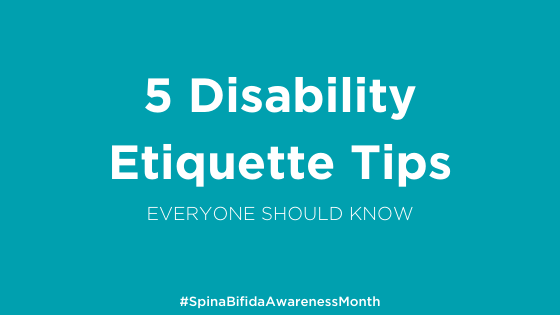
People who have not had the opportunity to spend much time with people with disabilities commonly feel a little unsure about what to do or say (or not say) when the situation arises. Fear of the unknown is normal. Here are some helpful tips to ensure everyone involved feels more comfortable.
5 Disability Etiquette Tips
- First and foremost, just treat people with disabilities like … people. They are individuals with unique combinations of interests, abilities, and life situations–just like everyone else. There’s no need to avoid eye contact, praise them for normal things like being at the grocery store, give kids high fives when you normally would not to a child without a disability, or make jokes about needing a license to use that wheelchair to alleviate your own nervousness. How would you act in that same situation with a person without a disability? Just do that.
- Always ask a person if they need help before assisting them. Though your help is well-intentioned, if you assist someone incorrectly you could end up causing harm to them or yourself. For instance, if you come up behind someone to push their wheelchair, it could set them off balance and injure them, and possibly you as well. People with disabilities live with their bodies every day, so they have most likely adapted to the world around them and figured out how to do things in a way that works for them. If you see someone with a disability struggling, feel free to ask if they could use some help. If they so no, respect their wishes.
- Don’t be afraid to ask questions! And allow children to ask questions, instead of shushing them for fear of being rude. Curiosity is natural. Rather than staring, it is better to say hello or ask someone a question if you have one. Most people with disabilities are happy to answer questions about their life, as long as they are appropriate. For example, asking “Why do you use a wheelchair?” is a perfectly appropriate question, but “Can you have sex?” is not a question appropriate to ask any stranger. Also, respect that sometimes a person may decline to answer your question if they don’t have the time or energy to educate that day.
- When planning events, make sure they are accessible. Many people with disabilities experience isolation and anxiety about whether places they go will be accessible. Choose activities that most people, regardless of abilities, can fully participate in independently and choose locations that they can safely enter and navigate.
- Be mindful of the language you use to describe disability. You don’t have to overanalyze everyday terms like “Stand up for what you believe in” or “Let’s take a walk” to a wheelchair user. But there are a few terms to avoid. Instead of saying the “r-word” as a diagnosis, use “intellectual disability.” Instead of “wheelchair-bound” or “confined to a wheelchair,” most people prefer the term “wheelchair user” because their chair gives them freedom rather than confines. Also, respect the type of language people use when referring to themselves. Some people prefer person-first language, such as “a person with Spina Bifida,” while others use identity-first language, like “disabled person.”
We hope these tips help you feel more confident and avoid frustrations in your interactions with your neighbors, coworkers, and friends with disabilities. Rest assured, even if you don’t know the right words to say, your tone and intention is what matters most and shines through.
Recent
Blog Post
Advocacy Alert – HHS Cuts Impact Programs Supporting People With Spina Bifida and Other Disabilities
Advocacy Alert – HHS Cuts Impact Programs Supporting People With Spina Bifida and Other Disabilities
Blog Post
Genetically Targeted Technologies (GTT) and the MINI Act
Genetically Targeted Technologies (GTT) and the MINI Act
Blog Post
The Spina Bifida Association Welcomes Ian Joyce as Its Newest Team Member